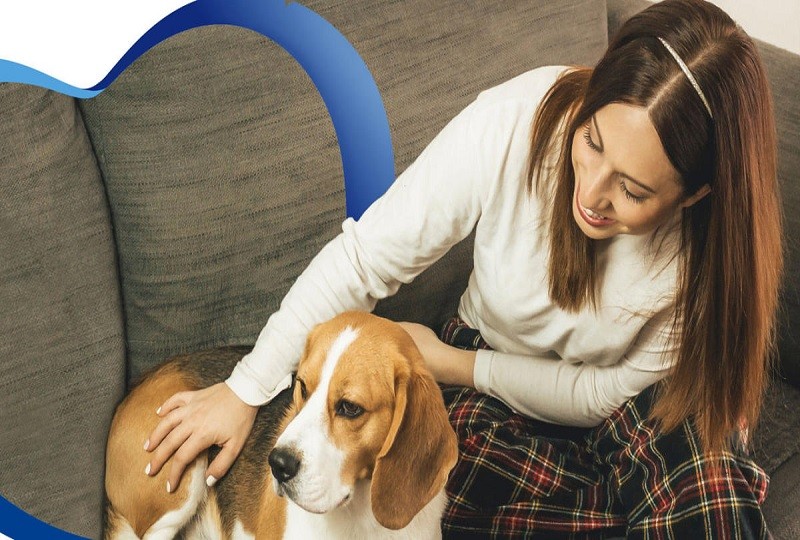First and foremost, visit the vet
Responsible pet ownership starts with regular vet visits. Given their life expectancy, your puppy should have a checkup at least once or twice a year. But establishing and maintaining your pet’s good health means keeping up with vet visits as they age.
Key tip: Before heading to the vet, take them for a walk. This is so they don’t associate getting in the car with going to the vet.
- Provide a safe, comfortable, and nurturing living environment
Just as humans need a home where they feel comfortable and safe, so do our pets.
Key tip: Pets who are too young or who are several years old lose their ability to regulate their body temperature efficiently. It’s important to provide them with a blanket and bed that provides comfort and warmth, especially at night.
- Meet their nutritional needs
All living organisms need food to survive. Unfortunately, many pets suffer from obesity and other metabolic problems due to poor nutrition. This can later lead to other health problems.
While there is debate about which dog food is most appropriate, there is a consensus. All pets need a good balance of protein, healthy fats, carbohydrates, and plenty of water (Pets, 2021). These should be fed in the right amounts and in the correct proportions.
Key Tip: Select a pet food formula that is appropriate for your pet’s age, health conditions, and activity level.
- Spay/Neuter Your Pet
Spaying your pet prevents a number of health problems (ASPCA, n.d.), including complicated pregnancies, and helps reduce homelessness. Because spaying or neutering is a surgery that requires general anesthesia, your pet will likely spend at least one night in the veterinarian’s office for observation and recovery.
Key Tip: Try to practice this procedure at a young age for your furry friend. This way, their recovery and healing process will be faster.
- Get Vaccinations on Time
Shortly after arriving home, the first trip should be to the vet. A vaccination schedule will then be established for your little puppy or kitten. This is to protect them from diseases such as rabies or distemper in the case of dogs. Cats also benefit from vaccines that prevent feline herpes virus, feline leukemia, and rabies.
Key Tip: If you adopted an older pet, make sure they are also protected. Vaccinations need to be renewed and are not just for young pets.
- Training as Well-being
One of the most important aspects of responsible pet care is ensuring your dog or cat is properly housebroken. Potty training is the number one priority, as is working on basic obedience training. A well-trained pet is a happy pet, and that translates into a happy parent.
Key tip: Reward-based training yields excellent results. You can include treats to help reinforce positive behavior.
- Find safe toys
Discard and replace worn toys. Squeaky toys can provide great entertainment for your dog. It’s important that the device that provides the squeaker can’t be detached from the toy. This object can easily be ingested, causing you to end up visiting the vet. Also, don’t forget to eliminate toys with loose parts that can present a choking hazard, and hard or sharp edges that could cause injury.
Key tip: Avoid toys that are too small; these can be easily swallowed or lodged in the throat. Plush toys are good for several purposes. They are sometimes very useful as rewards in a training program; however, they should be used with caution.
- Clean their paws regularly
Your pet’s paws are one of the most vulnerable parts of their body. If not properly cared for, they can become cracked, injured, or bleed easily, causing significant discomfort and difficulty walking. They are also exposed to bacteria present in the waste of other pets that aren’t vaccinated or purged regularly.
Key tip: You can use special alcohol-free pet wipes for this task. We also recommend using water and a special shampoo for their skin and coat.
- Teeth Cleaning
Just like people, your pets can suffer from not having regular dental cleanings. For this task, you can use special pet toothbrushes and toothpaste. Brushing their teeth regularly is the main way to remove soft plaque before it turns into calculus. The habit of cleaning teeth prevents things like bad breath and helps prevent other diseases (Pets, 2021).
Key Tip: In the absence of a regular prophylaxis appointment, you can provide them with dental treats and toys that will help preventatively and for maintenance purposes with this task.
- Give them all your love
We know it goes without saying. However, it’s worth reminding you how all pets truly crave relentless petting. They love affection, warmth, and smiles. Give your pet special attention, and they will return the unconditional love that only a pet can provide to your family.
Key tip: Paying attention to them and playing with them whenever you can earns them extra points in their hearts.
As pet owners, we all want the best for our furry friends. It’s important for all pet parents to have everything they need to raise happy and healthy pets. As a final tip, we recommend considering pet insurance that can cover the financial risk of your pet getting hurt or sick.
Finally, having pets is one of the best decisions you can make. Go ahead and consider adopting; this way, you’ll be doing something charitable that helps reduce animal abandonment. By having a furry friend in your life, you can discover your passion for animals. You’re sure to end up becoming a great caregiver to the most fun and loving members of a family.

